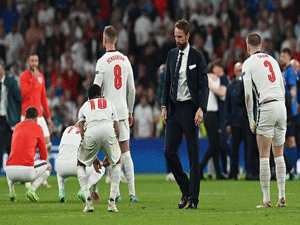RACISM: Racism is widespread in the UK and is not limited to football matches.
By Jennifer Hassan and Karla Adam
The three African players of the English team, who failed to score penalty goals and leading to loss for Italy, were abused both at the Wembley Stadium and on social media by British football fans
LONDON — British Prime Minister Boris Johnson on Monday condemned the racist abuse targeted at some of England’s Black players after the team’s widely watched loss to Italy in the Euro 2020 final Sunday.
Jadon Sancho, Marcus Rashford and Bukayo Saka were viciously targeted by trolls and angry England fans after the defeat at London’s Wembley Stadium. The team lost, 3-2, to Italy in a penalty shootout in which all three players missed their shots.
A wave of online abuse soon followed, with monkey and banana emoji and racist comments posted underneath photographs of the players on their personal Instagram accounts. Johnson said at an evening news conference that he hoped that those directing abuse “will crawl back under the rock from which you emerged.” Prince William, who is president of England’s Football Association and was at the game, tweeted that he was “sickened” by the comments.
England Manager Gareth Southgate said at a Monday morning news conference that the abuse was “unforgivable” and “just not what we stand for.” He continued: “We have been a beacon of light in bringing people together, in people being able to relate to the national team, and the national team stands for everybody.”
Shortly after the result, which crushed the hopes of millions who believed a championship was finally coming home to England after a 55-year wait, the term “Saka’s Instagram” began trending on Twitter as many highlighted the abusive comments being left on the 19-year-old’s page. Concerned fans urged other supporters to help protect the mental health of the players by reporting the abuse and leaving positive comments in its place. “Rashford, Sancho, Saka all missing is jet fuel to the worst people on the planet,” wrote one of many people expressing disgust at the treatment of the stars.
Some English football fans make it so hard to be an English football fan,” British author Matt Haig wrote.
Musa Okwonga, co-host of the Stadio football podcast, tweeted: “Hate is a strong word. But the racists relying on black English footballers to bring them glory as if they were their servants, then turning on them as soon as they fell short of their dreams, have my deepest contempt.”
The Football Association also condemned the abuse, saying it was “appalled” at the treatment of the players by social media users and called on the government and social media companies to do more to tackle the issue of online harassment. This was a reminder for many of why the England team “takes the knee” before matches in solidarity with the Black Lives Matter movement. On Sunday, players for both sides knelt before kickoff.
When the English team began doing so at the beginning of the tournament, some fans booed. Johnson initially was silent about those fans, and Home Secretary Priti Patel accused the team of “gesture politics.” Both ministers condemned racist abuse Monday, prompting accusations of hypocrisy.
England soccer player Tyrone Mings retweeted Patel, and added: “You don’t get to stoke the fire at the beginning of the tournament by labeling our anti-racism message as ‘Gesture Politics’ & then pretend to be disgusted when the very thing we’re campaigning against, happens.”
Sharing screenshots of some of the racist remarks, lawmaker David Lammy said the comments were an example of “why we take the knee.” Players of the England squad have frequently been hailed for standing up for human rights and minority groups, with captain Harry Kane wearing a rainbow armband to support LGBT pride during the game against Germany.
Standout winger Raheem Sterling was awarded an MBE from Queen Elizabeth II for his work to promote racial equality. Sterling, who was born in Jamaica, has been outspoken not just on racism during soccer games — he has faced such abuse from some in the crowd, prompting those fans to be banned from stadiums — but also structural racism and racism in the media.
Some of the worst racial abuse is found online. Earlier this year, professional soccer players boycotted social media for four days to highlight the abuse and racism directed at players and their frustration at social media platforms for not doing more about it. Two days after the ban ended, Facebook apologized for new racist comments directed at Sterling, which were removed from the platform.
Social media has also allowed players to use their huge followings to raise awareness of social issues and injustices. Rashford, 23, who also plays for Manchester United, successfully campaigned to help feed hungry children across the United Kingdom during school holidays.
Despite being hailed as a hero for his activism, a mural of the star was defaced in Manchester overnight after his penalty miss. After scoring a goal during a match in May 2020, Sancho, 21, took off his jersey to reveal another shirt that had the words “Justice for George Floyd” scrawled on the front — an action that earned Sancho a yellow card. “We shouldn’t fear speaking out for what’s right, we have to come together as one & fight for justice,” the star wrote on his Instagram account after the match.
Black Lives Matter UK said Monday that it was standing firmly alongside the players who had been “subjected to disgusting racial abuse.”Sunder Katwala, director of the think tank British Future, said racist remarks were commonplace a generation ago in stadiums, where right-wing hooligans might chant “Black goals don’t count.” But he said that while things are dramatically better today at football stadiums, the abuse has simply migrated online.
“I thought we’d won these arguments in society, but it’s gone online, where people are disinhibited,” Katwala said.
Coutersy:www.washingtonpost.com
